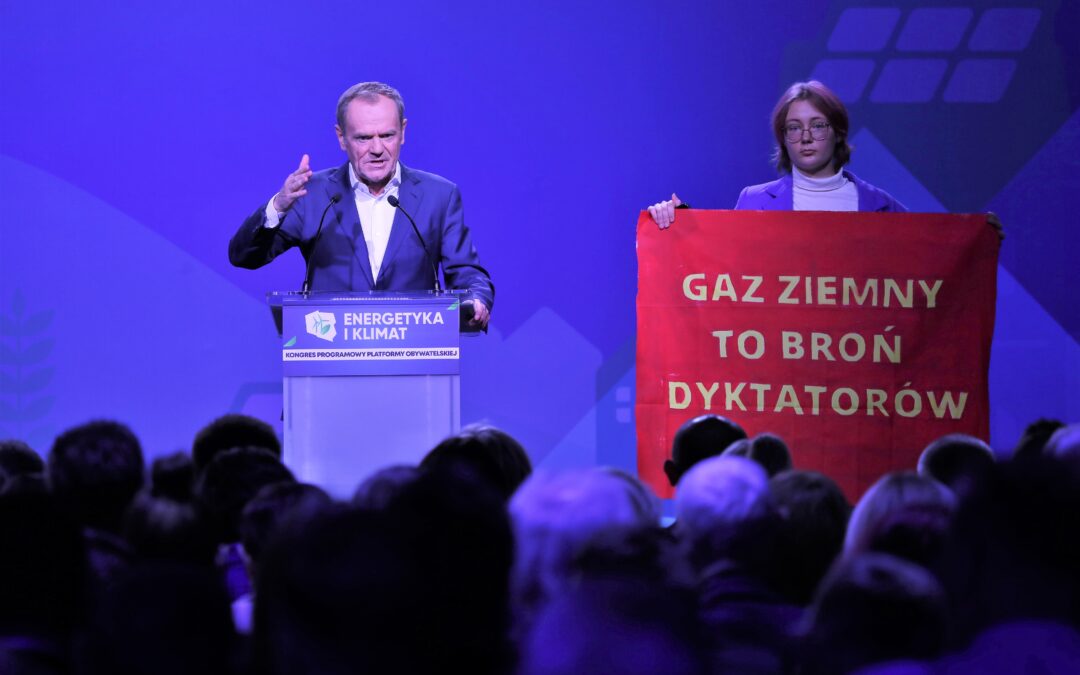Polish opposition leader Donald Tusk has admitted that his generation “was wrong” in its approach to climate and environmental protection, as he unveiled his Civic Platform (PO) party’s new set of green policies ahead of next year’s elections.
Among the proposals are phasing out coal more quickly than planned by the current government, reductions in logging, and better environmental monitoring, including of rivers.
“I am from this generation that, it must be said out loud today, was wrong, underestimating the issue of climate protection and environmental protection,” said the 65-year-old Tusk during his speech at the event in Warsaw, quoted by news outlet Gazeta.pl
“An honest examination of conscience is needed by everyone without exception,” he added. “If we were wrong, this is the time to rectify this situation…An environmentally secure planet requires competence, energy, courage, vision and agency…It needs synergy between the youngest and oldest.”
As he was speaking, a young activist appeared on stage holding a banner saying “Natural gas is a weapon of dictators”. When security began to try to remove her, Tusk asked them to leave her on stage. He then invited her to come to the front of the platform with her banner.
.@donaldtusk na #KongresProgramowyPO: Potrzebna jest synergia z najodważniejszymi i najmłodszymi! pic.twitter.com/phnbNaxLAI
— PlatformaObywatelska (@Platforma_org) November 24, 2022
In his speech, Tusk rejected the idea that there has to be a choice between “either climate protection or business”. He noted, for example, how communities have, by modernising heating and insulation and using renewable energy, both reduced energy bills and helped the environment.
Among the policies outlined by PO during the convention was a goal to reduce energy production from coal “by at least half” by 2030. Currently, around 70% of Poland’s electricity is generated from coal – by far the highest proportion in the EU – and one third of households burn it for heating.
The current Law and Justice (PiS) government plans to reduce coal to between 11% and 28% of the energy mix by 2040 and to close all Polish coal mines by 2049. However, it recently admitted that the current energy crisis will delay those plans, and may even see new coal mines open.
Musimy ratować naszą planetę. Nie ma planu B. Musimy działać natychmiast.
Oto nasze postulaty dot. rozwoju nowoczesnej energetyki 👇 pic.twitter.com/kQ1EMAc1CF
— PlatformaObywatelska (@Platforma_org) November 24, 2022
PO also pledged to increase solar energy capacity – something the PiS government has likewise been doing – and to revive the development of onshore wind, a sector that had thrived before 2015 under PO but was severely hindered by new restrictions put in place after PiS came to power that year.
Tusk’s party wants 20% of forests to be protected from logging and stronger environmental monitoring, including of rivers. Earlier this year, an ecological crisis in the Oder river led to the deaths of over 250 tonnes of fish, with many experts pointing to a lack of proper monitoring as one cause.
“I would like those who govern Poland…[to] finally understand that Polish rivers are not sewers, that Polish forests are not wood warehouses,” said Tusk yesterday.
But journalist Patryk Strzałkowski of Gazeta.pl notes that many will be sceptical as to whether Tusk and PO can provide better stewardship of Poland’s environment, given its record in government from 2007 to 2015.
A similar point was made by PiS spokesman Rafał Bochenek, who told Tusk that “deeds are important, not words”. As a two-term prime minister, Tusk “had unlimited possibilities to implement even the most ambitious projects in the field of energy”. So his new promises must be assessed in light of the “unfulfilled previous ones”.
While PiS has accepted the need to move towards zero- and lower-emission sources of energy, it has also been sceptical towards many of the EU’s more ambitious green policies, which party chairman Jarosław Kaczyński last year called “madness” based upon “unproven theories”.
Earlier this week, another centrist party, Poland 2050 (Polska 2050) unveiled its own new set of green policies, which included more support for small local renewable micro-energy installations and undoing restrictions on onshore wind turbines.
Main image credit: Slawomir Kaminski / Agencja Wyborcza.pl

Daniel Tilles is editor-in-chief of Notes from Poland. He has written on Polish affairs for a wide range of publications, including Foreign Policy, POLITICO Europe, EUobserver and Dziennik Gazeta Prawna.




















